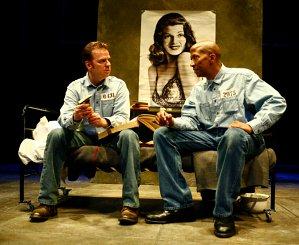The Shawshank Redemption
It takes guts - or foolhardiness, depending on your point of view - to bring a staggeringly successful film to the stage. Well, that might be the case except for the fact that this 'Shawshank Redemption' is not really a reworking of the film, but a reworking of the novella by Stephen King, the writer who apparently never sleeps judging by the voluminous quantity of his output. Even if this stage version goes back to the roots of the piece for its inspiration, it's still a ballsy kind of project, given the monumental success of the big screen version and the brilliant portrayal of Andy Dufresne by Tim Robbins.
Since there can't be very many people on the planet who've not heard of 'Shawshank' I won't waste valuable space by giving you a trite synopsis. One thing you can be sure about is that it remains faithful to the storyline which has even managed to hook me for more than a single viewing of the film. But being a stage version, there are some things that can't easily be replicated. So, for example, Andy's crawl to freedom through a tube filled with wreaking human excrement is, thankfully, left to the imagination.
The producers drew a line in the sand with their risk-taking when it came to casting the role of Red, the con who can get you anything. So, we're left with the casting as set down in the film, even though Red's actually white in King's story. That was a lost opportunity to differentiate the film and stage versions significantly, and to provide a more faithful interpretation of King's story.
Reg E Cathey's Red has a voice that is even more gravelly than Morgan Freeman's, and about an octave lower. But Cathey's Red is just as convincing as the down-to-earth lifer who knows that an act of brutal studpidity took away his freedom.
Kevin Anderson takes on the role of the enigmatic Andy Dufresne, but makes too much of the conflicting elements in Dufresne's character in the first half, resulting in confusion as to what actually makes Dufresne tick. Things get better in the second half when Dufresne rails against the prison governor's 'obtuse' blocking of his bid for justice and freedom, and Dufresne's character begins to distil and solidify.
Anderson and Cathey have the luxury of an excellent supporting cast to make the whole thing gel very nicely. Geoffrey Hutchings gives a powerful and emotional performance as the institutionalised Brooksie, and Diarmuid Noyes is the bubbly and affable Tommy who pays the ultimate price for trying to help Andy.
Overall, this was a surprisingly satisfying piece of theatre which ably stands on its very own 2 metaphorical feet as a compelling drama. Peter Sheridan's direction is tight and taught, and the whole venture rattles along at a brisk pace without ever flagging. Even though Stephen King takes the plaudits for the complex, engrossing plot, the characterisations of the minor parts work particularly well, and the claustrophobic and barbaric atmosphere of prison life is realised effectively, in particular in the well-orchestrated fight scenes. And the rape scene was graphic enough for us to be left with no doubt as to the ferocity of the assault, but not so graphic as to verge on the voyeuristically gratuitous.
So, was it all worth the risk? I think that question has to be answered in the affirmative if only because the quality of the story deserves a new treatment. And this is a treatment that more than does the story justice. "But is it as good as the film?", I hear you ask. If I had my arm twisted, I'd have to say that the film gets the gong but only because of Tim Robbin's exceptional performance and the fact that you can do so much more in film. In fact, the two versions provide very different experiences and should be judged on their own merits. And there's enough merit here to justify a visit.
What the popular press had to say.....
MICHAEL BILLINGTON for THE GUARDIAN says, "You read the book. You saw the movie. Now you can experience the play. Except I see no compelling reason, apart from the lead performances, why you should. For the main effect of this stage version...is to turn the Stephen King novella into prison melodrama." PAUL TAYLOR for THE INDEPENDENT says, "So there's certainly a large potential market for a stage version, but is there any artistic justification? Not really, in this attempt...The writers, Owen Neill and Dave Johns, have argued that theatre is a medium that uses metaphor better than film. Their handling of this resource is shaky and limited." BENEDICT NIGHTINGALE for THE TIMES says, "An odd yet gripping mix of brutishness and sentimentality, jailhouse melodrama and buddy play." HENRY HITCHINGS for THE EVENING STANDARD says, "This is a play that features some fine talking, but seems in the end too literal-minded...decent entertainment, not a masterpiece." BEN DOWELL for THE STAGE says, "Unquestionably moving and life affirming tale." CHARLES SPENCER for THE DAILY TELEGRAPH says, "The stage version is inferior to the movie...efficient production."
External links to full reviews from popular press
The Guardian
The Independent
The Times
Daily Telegraph
Production photos by Nobby Clark
Originally published on
